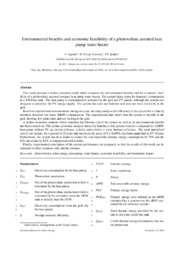Please use this identifier to cite or link to this item:
https://hdl.handle.net/11000/34222Full metadata record
| DC Field | Value | Language |
|---|---|---|
| dc.contributor.author | Aguilar, F. | - |
| dc.contributor.author | Crespí Llorens, Damián | - |
| dc.contributor.author | Quiles, P.V. | - |
| dc.contributor.other | Departamentos de la UMH::Ingeniería Mecánica y Energía | es_ES |
| dc.date.accessioned | 2025-01-08T11:45:42Z | - |
| dc.date.available | 2025-01-08T11:45:42Z | - |
| dc.date.created | 2019-09 | - |
| dc.identifier.citation | Solar Energy, 193 (2019) 20-30 | es_ES |
| dc.identifier.issn | 1471-1257 | - |
| dc.identifier.issn | 0038-092X | - |
| dc.identifier.uri | https://hdl.handle.net/11000/34222 | - |
| dc.description.abstract | This work presents a techno-economic study which evaluates the environmental benefits and the economic feasibility of a photovoltaic assisted compact heat pump water heater. The system heats water for domestic consumption in a 190 litres tank. The heat pump is simultaneously powered by the grid and PV panels, although the system was designed to prioritize the PV energy supply. The system does not use batteries and does not feed electricity to the grid. Based on experimental measurements during one year, the study analyses the efficiency of the system for a 4 family members domestic hot water (DHW) consumption. The experimental data shows that the system is friendly to the grid, showing low peak loads and not feeding to the grid. A techno-economic analysis which considers the lifetime cost of the system as well as its environmental benefits has been carried out. The techno-economic analysis shows the benefits of this system when it is compared to: a DHWheat pumpwithoutPV, an electrical heater, a boiler and a boiler+solar thermal collectors. The total annualized cost of the system, for a period of 25years and an electricity price of 0.2 €/kWh, has been quantified at 337 €/year. Furthermore, the system has been found to reduce the non-renewable primary energy consumption by 79% and the CO2 emissions by 82% in comparison with a boiler. Finally, experimental correlations of the system performance are proposed, so that the results of this work can be extended to other locations with similar climates. | es_ES |
| dc.format | application/pdf | es_ES |
| dc.format.extent | 11 | es_ES |
| dc.language.iso | eng | es_ES |
| dc.publisher | Elsevier | es_ES |
| dc.rights | info:eu-repo/semantics/openAccess | es_ES |
| dc.rights | Attribution-NonCommercial-NoDerivatives 4.0 Internacional | * |
| dc.rights.uri | http://creativecommons.org/licenses/by-nc-nd/4.0/ | * |
| dc.subject | Photovoltaics | es_ES |
| dc.subject | Solar energy | es_ES |
| dc.subject | Heat pump | es_ES |
| dc.subject | Water heater | es_ES |
| dc.subject | Economic feasibility | es_ES |
| dc.subject | Environmental impact | es_ES |
| dc.subject.other | CDU::6 - Ciencias aplicadas::62 - Ingeniería. Tecnología | es_ES |
| dc.title | Environmental benefits and economic feasibility of a photovoltaic assisted heat pump water heater | es_ES |
| dc.type | info:eu-repo/semantics/article | es_ES |
| dc.relation.publisherversion | https://doi.org/10.1016/j.solener.2019.09.032 | es_ES |

View/Open:
2019_aguilarDHW postprint-1.pdf
1,84 MB
Adobe PDF
Share:
.png)
